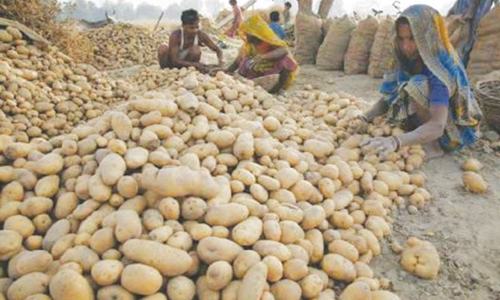KARACHI: Consumers are set to face a harsher wave of food inflation as flour millers once again raised flour no. 2.5 rate and 10 kg bag prices to Rs47.50 per kg and Rs480 from Rs45.50 and Rs460 per bag, respectively.
Apart from flour, biscuits, juices and packaged/tetra pak milk are set to become more expensive.
The price of maida and fine flour had been jacked up to Rs50.50 from Rs48.50 per kg. From April to Oct 17, flour millers had raised flour No.2.5, maida and fine flour prices at least a dozen times — a surge of Rs14 per kg — while the rate of 10 kg bag rose by Rs140.
In April, the rates of flour No.2.5 and 10 kg bag were Rs33.50 per kg and Rs340 while maida and fine flour were available at Rs36.50 per kg. Consumers had been paying high prices for flour varieties despite good wheat crop and ample stocks in the country.
High quality five kg and 10 kg bags of Bake Parlor and Ashrafi are being sold at Rs270-280 and Rs540. However, retailers claim distributors of these brands have hinted further jump in prices of five kg and 10 kg bag to Rs290-300 and Rs560-580.
Biscuits, juices and packaged milk to cost more
Defending the latest price hike, Chairman Pakistan Flour Mills Association (PFMA), Sindh Zone, Khalid Masood said millers remain dependent on open market for wheat as the Sindh government did not procure the grain from growers this year. The provincial government has not fixed any rate on old carryover stocks of last year, he added. “On paper, the Sindh government has 832,000 tonnes of wheat stocks but physically it does not have any,” the PFMA chief claimed.
He said despite carryover stocks of last year, the Sindh government should have procured at least 500,000-600,000 tonnes from the growers. In the past, every year Sindh government procured over one million tonnes.
He said wheat rate in the open market has swelled to Rs4,300 per 100 kg bag, showing a major jump from April 2019 when it was priced at Rs3,000 for a 100 kg bag.
The government in the third week of September decided to continue with a ban on wheat export to keep flour prices under control. Pakistan’s wheat exports in July-August 2019 plunged to 44,134 tonnes fetching $10.5 million as compared to 229,243 tonnes valuing $$49m, according to the figures of Pakistan Bureau of Statistics (PBS).
In first week of this month, the Economic Coordination Committee of the Cabinet ordered release of 350,000 tonnes of wheat in the market to check price hike.
The ECC approved a proposal of the Ministry of National Food Security and Research to release of 150,000 tonnes of wheat from the stocks of Pakistan Agricultural Storage and Services Corporation to the provincial government of Khyber Pakhtunkhwa. The meeting also directed the Sindh government to release 100,000 tonnes of wheat subject to the condition that it would also release another 100,000 tonnes out of its own stocks in to the market.
“The price of wheat and flour may remain under pressure in case Sindh government fails to release wheat,” Masood said.
Pricey biscuits, milk
In the second week of October, Governor Punjab Chaudhry Mohammad Sarwar inaugurated a manufacturing plant at Nestle Pakistan’s Sheikhupura factory. The investment at Nestle’s Fruita Vitals plant is $22m and the production capacity is 24,000 units per hour.
Before inauguration, the company in September had surged price of small fruit juice pack to Rs35 from Rs30, followed by one litre pack price to Rs200 from Rs175.
The company from October 1, 2019 had also raised price of Milk Pak one litre pack to Rs140 from Rs135, followed by one quarter pack to Rs35 from Rs30.
Similarly, the maker of Slice juices also raised prices to Rs25 from Rs20.
In biscuits, a packet, previously marked at Rs17 is now selling at Rs20, while some manufacturers had increased price of Rs10 pack to Rs15.
Retailers said neither tetra pack milk producers nor other manufacturers had given any reason of price hike despite the fact that rupee-dollar parity had remained stable for the last over two months.
They said the government is also not taking any notice that manufacturers are raising prices without enhancing weight and quantity of the products like biscuits, powder milk products, and shampoos, etc.
Published in Dawn, October 18th, 2019














































